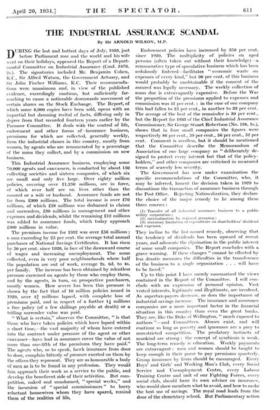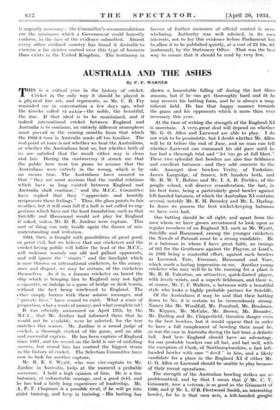THE LNDUSTRIAL ASSURANCE SCANDAL
By Sir ARNOLD WILSON, M.P.
DURING the last and hottest days of July, 1933, just before Parliament rose and the world and his wife went on their holidays, appeared the Report of a Depart- mental *Committee on Industrial Assurance (Cmd. 3476. 2s.). The signatories included Mr. Benjamin Cohen, K.C., Sir Alfred Watson, the Government Actuary, and Sir John Fischer Williams, K.C. Their recommenda- tions were unanimous and, in view of the published evidence, exceedingly cautious, but sufficiently far- reaching to cause a noticeable downwards movement of certain shares on the Stock Exchange. The Report, of which some 6,000 copies have been sold, opens with an impartial but damning recital of facts, differing only in degree from that recorded fourteen years earlier by the Pannoor Committee. It deals with the control of life, endowment and other forms of Ansurance business, premiums for whieh arc collected, generally weekly, from the industrial classes in this country, mostly from women,:by agents who are remunerated by a percentage of the sums they collect, and by a commission on new business.
This Industrial Assurance business, employing some 70,000 agents and canvassers, is conducted by about 150 collecting societies and sixteen companies, of which six are small and only five large: Over eighty million policies, covering over £1,250 millions, are in force, of which over half are on lives other than the assured or a wife or husband. Assurance funds are not far from £300 millions. The total income is over £70 millions, of which £28 millions was disbursed in claims and surrenders, £30 millions in management and other expenses and dividends, whilst the remaining £12 millions was added to assurance funds, which today approach £300 millions in value.
The premium income for 1932 was over £56 millions ; a sum exceeding by 25 per cent. the average total annual purchases of National Savings Certificates. It has risen by 50 per cent. since 1920, in face of the downward course of wages and increasing unemployment. The sums collected, even in very poor neighbourhoods where half the population are out of work, average 2s. 6d. to 4s. per family. The increase has been obtained by relentless pressure exercised on agents by those who employ them, and by the agents, in turn, on prospective purchasers, mostly women. How severe has been this pressure is shown by the fact that of 10 million policies issued in 1929, Over 41 millions lapsed, with complete loss of premiums paid, and in respect of a further 1} millions a free policy (of a few shillings payable at death) or a trifling surrender value was paid.
" What is certain," observes the Committee, " is that those who haVe taken policies which have lapsed within a short time,—the vast majority of whom have entered into the contract under pressure of the agent or other canvasser—have had in assurance cover the value of not more than one-fifth of the premiums they have paid." The agemts who, so to speak, hawk insurance from door to door, complain bitterly of pressure exerted on them by the offices they represent. They are as honourable a body of men as is to be found in any profession. They would fain approach their work as a service to the public, and develop the beneficent side of their activities. But com- petition, naked and unashamed, " special weeks," and the incursion of " special commissioners " to harry reluctant housewives whom they have spared, remind them of the realities of life, Endowment policies have increased by 350 per cent. since 1920. The multiplicity of policies on aged persons (often taken out without their knowledge)—a remunerative type of speculative business which has been sedulously fostered—facilitates " economic waste on expenses of every kind," but 90 per cent. of this business would probably be unobtainable if the consent of the assured was legally necessary. The weekly collection of sums due is extravagantly expensive. Before the War the proportion of the premiums applied to expenses and commission was 41 per cent. : in the case of one company this had fallen to 25 per cent., in another to 83 per cent. The average of the best of the remainder is 89 per cent., but the Report for 1933 of the Chief Industrial Assurance Commissioner, Sir George Stuart Robertson (No. 138, ls.), shows that in four small companies the figures were respectively 86 per cent., 59 per cent., 56 per cent., 52 per cent. Comment is needless, but it should be mentioned that the Committee describe the Memorandum of Association of one large company as " deliberately de- signed to protect every interest but that of the policy- holders," and other companies are criticised in measured terms of scarcely less severity.
The Government has now under examination the specific recommendations of the Committee, who, it may be inferred, lament the decision taken in 1929 to discontinue the transaction of assurance business through the Post Office. Rejecting Nationalization, they declare the choice of the major remedy to lie among these three courses : (1) Transfer of all indmitrial assurance business to a public utility corporation ;
(2) rationalization by regional grouping ; (3) statutory limitation of expenditure on shareholders dividend and expenses.
They incline to the last-named remedy, observing that the tendency of dividends has been upward of recent years, and advocate the elimination in the public interest The Report concludes with a of some small companies.
grave warning. If these changes " cannot be effected by less drastic measures the difficulties in the transference of the business to a single organization . . . will have to be faced."
Up to this point I have merely summarized the views contained in the Report of the Committee. I will con- clude with an' expression of personal opinion. Vast vested interests, legitimate and illegitimate, are involved. As supertax-payers decrease, so does the importance of industrial savings increase. The insurance and assurance companies are a more important factor in the financial situation• in this country than even the great banks. They are, like the Duke of Wellington, " much exposed to authors "—and Committees. Abuses exist, and will continue so long as poverty and ignorance are a prey to unrestricted competition. The predatory instincts of mankind are strong : the concept of symbiosis is weak. The long-term remedy is education. Weekly payments are extravagant : men and women should be taught to keep enough in their purse to pay premiums quarterly. Group insurance by firms should be encouraged. Every Boys' and Girls' and Working Man's Club, every Social Service and Unemployment Centre, every Labour Training Centre and unit of our Fighting Forces, every social club, should have its own adviser on insurance, who would show members what to avoid, and how to make the best use of savings. The royal road leads from the door of the elementary school. But Parliamentary action is urgently necessary : the Committee's recommendations are the minimum which a Government could honestly endorse, in the faCe of the evidence submitted. Almost every other civilized country has found it desirable to exercise a far stricter control over this type of business than exists in the United Kingdom. The testimony in favour of further measures of official control is over- whelming. Authority was well advised, in its own interests, not to lay this evidence before Parliament but to allow it to be published quietly, at a cost of £2 19s. 6d. (unbound), by the Stationery Office. That was the best way to ensure that it should be read by -very few.













































 Previous page
Previous page